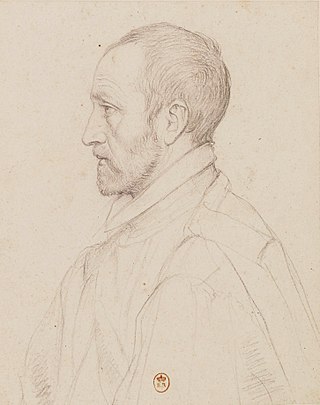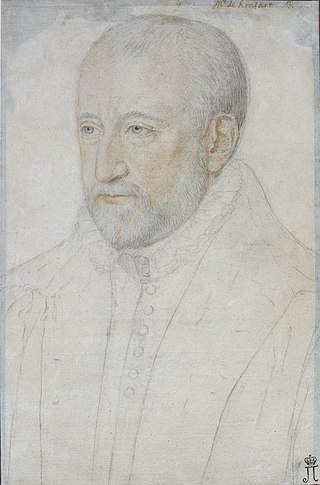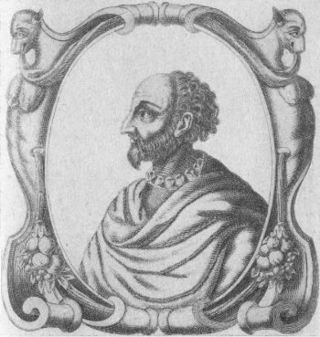Related Research Articles

Jean Daurat was a French poet, scholar and a member of a group known as The Pléiade.

Pierre de Ronsard was a French poet known in his generation as a "prince of poets". His works include Les Amours de Cassandre (1552),Les Hymnes (1555-1556), Les Discours (1562-1563), La Franciade (1572), and Sonnets pour Hélène (1578).
This article contains information about the literary events and publications of 1532.
La Pléiade was a group of 16th-century French Renaissance poets whose principal members were Pierre de Ronsard, Joachim du Bellay and Jean-Antoine de Baïf. The name was a reference to another literary group, the original Alexandrian Pleiad of seven Alexandrian poets and tragedians, corresponding to the seven stars of the Pleiades star cluster.

Jean Antoine de Baïf was a French poet and member of the Pléiade.

Jacques Mauduit was a French composer of the late Renaissance. He was one of the most innovative French composers of the late 16th century, combining voices and instruments in new ways, and importing some of the grand polychoral style of the Venetian School from Italy; he also composed a famous Requiem for the funeral of Pierre de Ronsard.
Lazare de Baïf (1496–1547) was a French diplomat and humanist. His natural son, Jean-Antoine de Baïf, was born in Venice, while Lazare was French ambassador there.
French Renaissance literature is, for the purpose of this article, literature written in French from the French invasion of Italy in 1494 to 1600, or roughly the period from the reign of Charles VIII of France to the ascension of Henry IV of France to the throne. The reigns of Francis I and his son Henry II are generally considered the apex of the French Renaissance. After Henry II's unfortunate death in a joust, the country was ruled by his widow Catherine de' Medici and her sons Francis II, Charles IX and Henry III, and although the Renaissance continued to flourish, the French Wars of Religion between Huguenots and Catholics ravaged the country.

Guillaume Costeley [pronounced Cotelay] was a French composer of the Renaissance. He was the court organist to Charles IX of France and famous for his numerous chansons, which were representative of the late development of the form; his work in this regard was part of the early development of the style known as musique mesurée. He was also one of very few 16th century French composers of music for keyboard. In addition, he was a founding member of the Académie de Poésie et de Musique along with poet Jean-Antoine de Baïf, and he was one of the earliest composers to experiment with microtonal composition.
Louis Aimé Victor Becq de Fouquières was a versatile French man of letters from Paris.
Nationality words link to articles with information on the nation's poetry or literature.
Joachim Thibault de Courville was a French composer, singer, lutenist, and player of the lyre, of the late Renaissance. He was a close associate of poet Jean Antoine de Baïf, and with Baïf was the co-founder of the Académie de Poésie et de Musique, which attempted to re-create the storied ethical and moral effect of ancient Greek music through a type of vocal musical composition known as musique mesurée.
The Académie de Poésie et de Musique, later renamed the Académie du Palais, was the first Academy in France. It was founded in 1570 under the auspices of Charles IX of France by the poet Jean-Antoine de Baïf and the musician Joachim Thibault de Courville.
Nationality words link to articles with information on the nation's poetry or literature.
Nationality words link to articles with information on the nation's poetry or literature.
Nationality words link to articles with information on the nation's poetry or literature.
The year 1584 in science and technology included many events, some of which are listed here.
Nicolas Métru was a French organist, viol player, and composer of pieces for viol and airs. From 1642 he was organist at St. Nicolas-des-Champs, then some time later master of music for the Jesuits. He taught Couperin and Lully and was an outstanding viol player.
Fabrizio Mordente was an Italian mathematician. He is best known for his invention of the "proportional eight-pointed compass" which has two arms with cursors that allow the solution of problems in measuring the circumference, area and angles of a circle. In 1567 he published a single sheet treatise in Venice showing illustrations of his device.
References
- ↑ "Jean-Antoine de Baif" in Weinberg, Bernard, ed., French Poetry of the Renaissance, Carbondale: Southern Illinois University Press, Arcturus Books edition, 1964, fifth printing, 1974 (first published in France, 1954), ISBN 0-8093-0135-0, p. 132.
- ↑ Camerota, Filippo (2012). "Mordente, Fabrizio". Biographical Dictionary of Italian. Vol. 76.